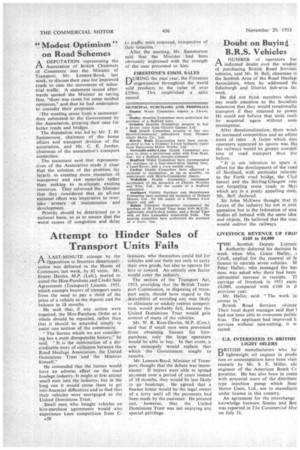Attempt to Hinder Sales of Transport Units Fails
Page 30

If you've noticed an error in this article please click here to report it so we can fix it.
A LAST-MINUTE attempt by the rt Opposition to frustrate. denationalization was defeated in the House of Commons, last week, by 42 votes. Mr.. Ernest Davies, M.P. (Lab.), moved to annul the Hire-Purchase and Credit Sale Agreements (Transport) Licence, 1953; which exempts buyers of transport units from the need to pay a third of the price of a vehicle as the deposit and the balance in 18 months.
He said that if any action were• required, the Hire-Purchase Order as a whole should be repealed, rather than that it should be amended simply to assist one section of the community. • "The licence which we are considering has a most disreputable history," he said. "It. is the culmination of a discreditable story of collusion between the Road Haulage Association; the United Dominions Trust and the Minister himself."
He contended that the licence would have an adverse effect on the road haulage industry. It might at first attract small men into the industry, but in the long run it would cause them to get into financial difficulties and to find that their vehicles were mortgaged to the United Dominions Trust.
Small men who bought vehicles on hire-purchase agreements would also experience keen competition from C • A28
licensees, who themselves could bid for vehicles and use them not only to carry their own goods, but also to operate for hire Or reward. An entirely new factor would enter the industry.
The section of the Transport Act, 1953, providing that the British Transport Commission, in disposing of transport units, should have regard to the „desirability of avoiding any step likely to eliminate or unduly restrict competition, would probably fail, because the United Dominions Trust would gain control of many of the vehicles.
Mr. W. R. Rees-Davies, M.P. (Con.), said that if small men were prevented from obtaining finance for hirepurchase, only the large operators Would be able to buy. In that event, a new 'monopoly would replace that which the -Government sought to remoVe.
Mr. Lennox-Boyd, Minister of Transport, thought that the debate was inconsistent. If buyers were able to spread payment over a period of years instead Of 18 months, they would be less likely to go bankrupt. He agreed that a finance house would be the legal owner of a lorry until all the payments had been made by the customer. He Pointed out, however, that the United Dominions Trust was not enjoying any special privilege.




















































































